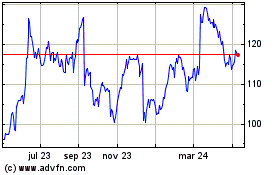By John D. McKinnon
WASHINGTON--A Pentagon watchdog concluded that few actual
problems occurred in awarding the hotly-disputed JEDI cloud
computing contract--in a victory for Microsoft Corp., which won the
pact .
The Defense Department's inspector general found, after a
lengthy investigation, that the award process was generally
consistent with federal procurement laws and policies, despite
complaints from several frustrated bidders, including Amazon.com
Inc. and Oracle Corp. Several tech giants competed fiercely for the
contract, which is worth up to $10 billion over 10 years.
The Pentagon report also concluded that available evidence
suggests Microsoft's selection last year didn't appear to stem from
White House pressure. However, the investigation was hampered by
White House assertions of presidential privilege, which effectively
prevented some senior Pentagon officials from answering questions,
the IG's office said.
Amazon--long regarded as the front-runner for the JEDI
contract--has contended that President Trump's public criticisms of
the contract process and Amazon itself played an unfair role in the
Pentagon's decision. Mr. Trump has been a sharp critic of Amazon,
its founder, Jeff Bezos, and the Washington Post, which Mr. Bezos
owns.
JEDI stands for Joint Enterprise Defense Infrastructure.
"The evidence we received showed that the DoD personnel who
evaluated the contract proposals and awarded Microsoft the JEDI
Cloud contract were not pressured regarding their decision on the
award of the contract by any DoD leaders more senior to them, who
may have communicated with the White House," the Pentagon inspector
general office said in a news release.
The report says that the White House asserted a "presidential
communications privilege" in preventing senior DoD officials from
directly answering IG questions about any discussions they had with
White House officials concerning JEDI. The White House offered to
let the officials answer in writing and then the White House would
review those answers, but the IG's office concluded that wasn't
workable, explaining "it would not be an appropriate and practical
way to conduct our review," according to the report.
However, the document goes on to say that people involved in the
selection process didn't report feeling any outside influence or
pressure. Those people said that "public statements from the
president and 'media swirl' about the contract did not directly or
indirectly influence the integrity of the procurement process or
the outcome of the JEDI cloud source selection," according to the
report.
Still, media reports about the public controversy, including Mr.
Trump's statements, "may have created the appearance or perception
that the contract award process was not fair or unbiased," the
report notes.
It also concludes that ethical lapses by a DoD official with
Amazon ties were not consequential. The official, Deap Ubhi,
previously worked at Amazon Web Services before going to the
Pentagon, where he worked on the JEDI program's early development,
even after restarting employment negotiations with Amazon. He later
returned to work for AWS.
His involvement fueled protests by Oracle in particular. But the
IG report concludes that Mr. Ubhi's role in JEDI "was not
substantial and did not provide any advantage to his prospective
employer, Amazon." Mr. Ubhi didn't respond to requests for
comment.
In a separate statement, the Pentagon said the report validates
the department's decision.
"The [Inspector General's] final report on the JEDI Cloud
procurement confirms that the Department of Defense conducted the
JEDI Cloud procurement process fairly and in accordance with law,"
said the statement from Lt. Col. Robert Carver. "This report should
finally close the door on the media and corporate-driven attacks on
the career procurement officials who have been working tirelessly
to get the much needed JEDI cloud computing environment into the
hands of our front-line warfighters."
Microsoft said the report "makes clear the DoD established a
proper procurement process." Amazon said it leaves many questions
unanswered about the Pentagon's handling of the JEDI deal,
including the merits of the award to Microsoft and the Trump
administration's role.
"The White House's refusal to cooperate with the IG's
investigation is yet another blatant attempt to avoid a meaningful
and transparent review of the JEDI contract award," the company
said.
Oracle didn't respond to requests for comment.
The report doesn't end the controversy over the JEDI deal. The
contract remains on hold, following a complaint by Amazon that is
pending in the U.S. Court of Federal Claims. A judge issued a
preliminary injunction earlier this year blocking the Pentagon from
proceeding with the contract, saying that Amazon was likely to
prevail on its claim that the Pentagon improperly evaluated certain
pricing issues.
In its report, the inspector general's office said, "we do not
draw a conclusion regarding whether the DoD appropriately awarded
the JEDI Cloud contract to Microsoft rather than Amazon Web
Services. We did not assess the merits of the contractors'
proposals or DoD's technical or price evaluations; rather we
reviewed the source selection process and determined that it was in
compliance with applicable statutes, policies, and the evaluation
process."
The Pentagon is seeking to reconsider certain aspects of the
contract award. Amazon argues in court that those efforts are an
attempt to keep the award in Microsoft's hands.
Microsoft added on Wednesday: "It's now apparent that Amazon bid
too high a price and is seeking a do-over so it can bid again...At
this stage, Amazon is both delaying critical work for the nation's
military and trying to undo the mistake it made when it bid too
high a price."
Glenn Fine, the former acting inspector general at the Pentagon,
oversaw the probe. Mr. Trump removed him from that post earlier
this month, and he returned to being the principal deputy inspector
general. Mr. Fine's removal meant he could no longer serve as head
of a federal panel created by Congress to keep tabs on the
government's management of the $2 trillion coronavirus stimulus
package; the White House had opposed the oversight.
Write to John D. McKinnon at john.mckinnon@wsj.com
(END) Dow Jones Newswires
April 16, 2020 03:18 ET (07:18 GMT)
Copyright (c) 2020 Dow Jones & Company, Inc.
Oracle (NYSE:ORCL)
Gráfica de Acción Histórica
De Mar 2024 a Abr 2024

Oracle (NYSE:ORCL)
Gráfica de Acción Histórica
De Abr 2023 a Abr 2024
